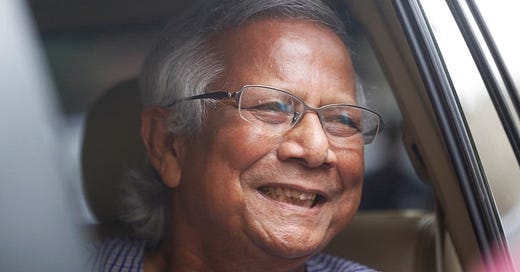
“Bangladesh has got a second independence,” said the smiling Nobel laureate, Muhammad Yunus, as he was sworn in today as head of a new caretaker government, in a country that has been rocked by some of the worst violence in years.
The 84-year-old social entrepreneur and economist takes over three days after Bangladesh’s prime minister, Sheikh Hasina, fled across the border to India, bringing her 15-year rule to an abrupt end, as protesters stormed her palace in Dhaka.
Protests began as a demand to abolish a controversial quota system but morphed into a wider student-led movement to oust Hasina, whose rule has been marked by increasingly brutal repression. The ruthlessness of the government’s security forces – which have used live ammunition against protesters and killed over 400 of them – has shocked the nation.
Yunus has been brought in as interim leader following talks among military officials, civic leaders and the student activists who led the uprising against Hasina.
He will usher in a “beautiful democratic” process, after years of autocratic rule, declared General Waker-Uz-Zaman, the country’s military chief, in a televised address to the nation yesterday.
Is Yunus up to the task?
Nicknamed “banker to the poor”, he is lauded for his pioneering use of micro-loans, credited with helping to lift millions of Bangladeshis out of poverty, particularly women.
He is a longtime critic of Hasina and is currently on bail, appealing against a six-month jail term in what he labels a politically-motivated case.
As Yunus was sworn in as head of the interim government today, the ceremony began with a minute’s silence to remember those who were killed in the recent protests. Among the attendees was Adilur Rahman Khan, one of Bangladesh’s most prominent human rights activists, who was imprisoned by the ousted regime for exposing the government’s role in enforced disappearances and extrajudicial killings.
Despite these encouraging first signs of change ahead, Yunus will face manifold challenges.
An immediate one will be to re-establish law and order after the unrest of recent weeks. Even last night, many residents of Dhaka were carrying sharp weapons to guard their neighbourhoods, as loudspeakers from the mosques warned of multiple robberies taking place.
Another major challenge will be to repair the deep mistrust that the people of Bangladesh feel towards the country’s police, judiciary, and other state-run institutes. Police, for instance, have allegedly destroyed hospital death registers to hide the true death toll from recent demonstrations.
Yunus will face pressure, especially from students involved in the movement to oust Hasina, to set up some sort of judicial procedure to hold authorities accountable for the excessive violence used against protesters, and to ensure justice for the hundreds who have lost their lives.
There are big economic challenges to contend with too. Even before the political unrest, the economic situation in Bangladesh was worsening. In May, the country’s reserves of foreign currency fell below US$19 billion (£15 billion) for the first time in 11 months.
On top of that, Yunus will have to keep a watchful eye on Hasina’s son, Sajeeb Wazed Joy. In Bangladesh’s dynastic political culture, many saw Joy as Hasina’s natural successor. “The family of Bangabandhu has not gone anywhere,” insisted Joy, in a video message posted on his Facebook page yesterday.
The Students Against Discrimination group, that led Bangladesh’s anti-government protests told CNN today: “We are very delighted to say that Dr. Yunus has agreed to accept this challenge to save Bangladesh as per our students’ request.” No pressure.
Write to us with your comments to be considered for publication at letters@reaction.life











